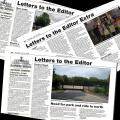
SIR: John Hearn’s article was an eminently reasonable vision of a civilised city (Chronicle, April 8). A city where the streets are primarily for the use of the many people who live in it and have a moderate desire for healthy space, rather than a relatively small number of people who feel they have an unfettered right to much more space and a right to make that space unhealthy. Such rationality, as usual, attracts vituperation.
Putting aside the Mr Toad letter from Robert Malyn (Chronicle, April 15) who argues that speed limits should increase in order to make roads safer and then categorises other road users as ‘idiots’, the attacks on the Hearn article are classic ones arguing the general from the particular. Of course, there are people with disabilities and of course there are people in rural settlements, who need a proper transport disposition, but how is that an argument for allowing anybody to drive everywhere?
Read next:
- Former planning chief airs radical ideas for the future of Winchester
- LETTER: Winchester does not need lower speed limits
- LETTERS: Radical vision for Winchester needs a rethink
The ersatz indignation at persecuted motorists needs elementary scrutiny. Motorists are massively subsidised – to more than three times the total tax and duty take on their activity. Subsidy in Winchester includes public parking that comes nowhere near paying the resource cost of its provision, and the externalising costs placed on public health, on public transport by impeding more efficient access, on shops and businesses through reducing the total access of people and the costs of occupying valuable space. The subsidy is highly regressive – it is enjoyed only by motorists but paid by all, including the non-motorists who are likely on average to be poorer.
The Climate Crisis is literally an existential threat; it demands behaviour change. Climate justice - the need to take our fair share of the burden of behaviour change is global, but it should also operate locally. Car-domination of our economy is as unfair as it is dangerous and unsustainable. Why does Charles Hobbs consider that he has some natural right to more space than the non-motorist? (Chronicle, Letters, April 15). Why does he think he has a right to pollute the streets of Winchester and restrict the rights of others to active movement or efficient public transport?
Chris Gillham,
Upper High Street,
Winchester



Comments: Our rules
We want our comments to be a lively and valuable part of our community - a place where readers can debate and engage with the most important local issues. The ability to comment on our stories is a privilege, not a right, however, and that privilege may be withdrawn if it is abused or misused.
Please report any comments that break our rules.
Read the rules hereLast Updated:
Report this comment Cancel